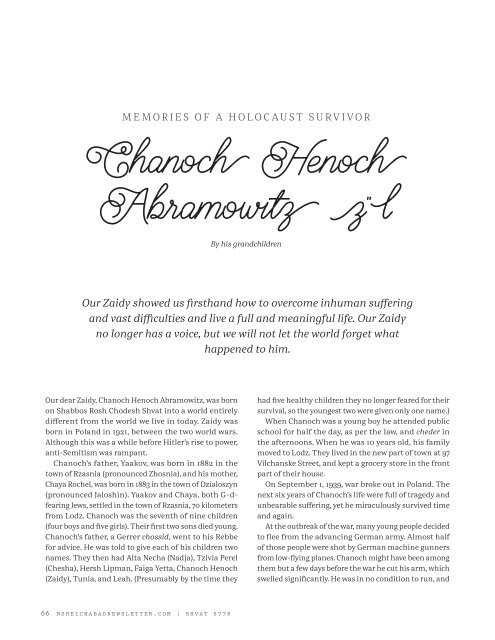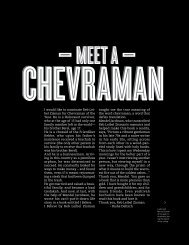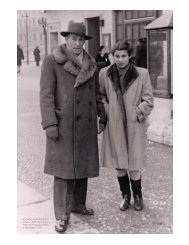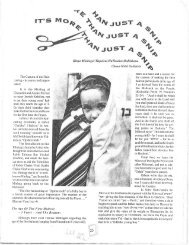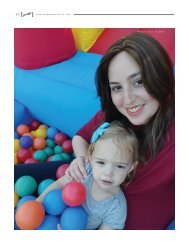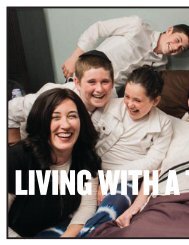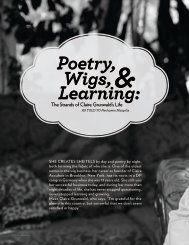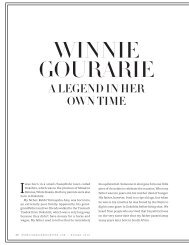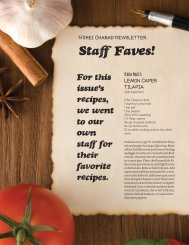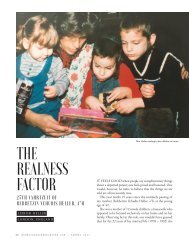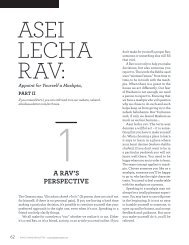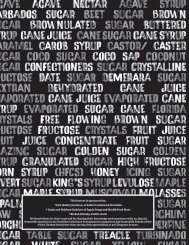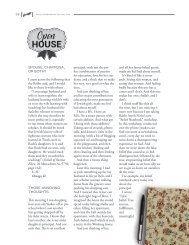Abramowitz
Create successful ePaper yourself
Turn your PDF publications into a flip-book with our unique Google optimized e-Paper software.
MEMORIES OF A HOLOCAUST SURVIVOR<br />
Chanoch Henoch<br />
<strong>Abramowitz</strong> z”l<br />
By his grandchildren<br />
Our Zaidy showed us firsthand how to overcome inhuman suffering<br />
and vast difficulties and live a full and meaningful life. Our Zaidy<br />
no longer has a voice, but we will not let the world forget what<br />
happened to him.<br />
Our dear Zaidy, Chanoch Henoch <strong>Abramowitz</strong>, was born<br />
on Shabbos Rosh Chodesh Shvat into a world entirely<br />
different from the world we live in today. Zaidy was<br />
born in Poland in 1921, between the two world wars.<br />
Although this was a while before Hitler’s rise to power,<br />
anti-Semitism was rampant.<br />
Chanoch’s father, Yaakov, was born in 1882 in the<br />
town of Rzasnia (pronounced Zhosnia), and his mother,<br />
Chaya Rochel, was born in 1883 in the town of Dzialoszyn<br />
(pronounced Jaloshin). Yaakov and Chaya, both G-dfearing<br />
Jews, settled in the town of Rzasnia, 70 kilometers<br />
from Lodz. Chanoch was the seventh of nine children<br />
(four boys and five girls). Their first two sons died young.<br />
Chanoch’s father, a Gerrer chossid, went to his Rebbe<br />
for advice. He was told to give each of his children two<br />
names. They then had Alta Necha (Nadja), Tzivia Perel<br />
(Chesha), Hersh Lipman, Faiga Yetta, Chanoch Henoch<br />
(Zaidy), Tunia, and Leah. (Presumably by the time they<br />
had five healthy children they no longer feared for their<br />
survival, so the youngest two were given only one name.)<br />
When Chanoch was a young boy he attended public<br />
school for half the day, as per the law, and cheder in<br />
the afternoons. When he was 10 years old, his family<br />
moved to Lodz. They lived in the new part of town at 97<br />
Vilchanske Street, and kept a grocery store in the front<br />
part of their house.<br />
On September 1, 1939, war broke out in Poland. The<br />
next six years of Chanoch’s life were full of tragedy and<br />
unbearable suffering, yet he miraculously survived time<br />
and again.<br />
At the outbreak of the war, many young people decided<br />
to flee from the advancing German army. Almost half<br />
of those people were shot by German machine gunners<br />
from low-flying planes. Chanoch might have been among<br />
them but a few days before the war he cut his arm, which<br />
swelled significantly. He was in no condition to run, and<br />
66 NSHEICHABADNEWSLETTER.COM | SHVAT 5778
SHVAT 2018 | NSHEICHABADNEWSLETTER.COM 67
thus his life was spared from German machine guns.<br />
In the fall of 1939, Chanoch’s family returned to<br />
Rzasnia, hoping it would be safer than the big city. From<br />
there, Chanoch would smuggle chickens and other goods<br />
into Lodz. One evening he was intercepted by SS officers,<br />
who arrested him and took him to the station house.<br />
They proceeded to beat him for three hours straight. He<br />
was then placed in a holding cell where he was told that<br />
he would be shot in the morning. At eight o’clock the<br />
next morning, an officer entered his cell and snipped his<br />
hair, cutting into his scalp with every cut of the scissors.<br />
When he was done, a different SS officer sent him home.<br />
His release was inexplicable, and to the end of his life<br />
Chanoch believed the SS officer who sent him home was<br />
a malach sent from heaven.<br />
The night of his release was in the dead of winter and<br />
a huge snowstorm had descended upon Lodz. His home<br />
was 40 kilometers, about 25 miles, away from the station<br />
house. As he was walking, a person passed him on a sleigh<br />
and drove him ten kilometers. He then continued walking<br />
in waist-deep snow. After walking another three or four<br />
kilometers, Chanoch could no longer carry on, and he<br />
fell to the ground almost lifeless. Another Pole passed<br />
and graciously took him all the way to Chanoch’s own<br />
home. Finally, exhausted, frozen, battered and bleeding,<br />
he stumbled across the threshold of his house.<br />
After spending a few months recuperating at home,<br />
Chanoch decided to flee Poland and escape to Russia,<br />
along with two of his friends. In Malkinia, a town near the<br />
border of then-Soviet Belarus, they were joined by tens<br />
of thousands of other Jews hoping to find a safe haven<br />
in the Soviet Union. Chanoch and his friends somehow<br />
got across the border into Bialystok, only to be met with<br />
rampant illness and starvation. The city was teeming<br />
with refugees who were sleeping everywhere—in the<br />
streets, the train stations, the shuls. After eight days in<br />
Bialystok, Chanoch’s companion insisted that they return<br />
to Poland where they at least had food. And so, Chanoch<br />
returned to Rzasnia.<br />
Conditions for the Jews worsened. Jews were ordered<br />
to wear the yellow star, and it was dangerous to be<br />
identified as a Jew. Jews were ridiculed in public and<br />
beaten, sometimes to death, and men were hauled off<br />
to camps, never to be seen again. Under these conditions,<br />
Chanoch stayed with his family in Rzasnia for nearly<br />
two years.<br />
IN THE CAMPS<br />
In June 1941, Chanoch was rounded up and transported<br />
by cattle car to Leszno (Lissa) labor camp, a sub-camp of<br />
Poznan (Posen). (His brother Hirsh Lipman was sent there<br />
a few weeks earlier. Hirsh Lipman managed to escape<br />
and went into hiding, but he was ultimately captured<br />
and killed. Hashem yikom damo.)<br />
In the summer of 1942 the Nazis gathered all the Jews<br />
of Rzasnia to the town church and transported them<br />
to Treblinka, where most perished, including two of<br />
Chanoch’s sisters and both his parents. Hashem yikom<br />
damam.<br />
In Posen, the inmates worked very hard building<br />
railroad tracks. Life was difficult, and many people<br />
died of hunger and typhus. People were hanged daily<br />
for committing “crimes” such as stealing potatoes<br />
for sustenance. The head of the camp, Commander<br />
Wolkowitch, was very cruel and instilled terror into the<br />
hearts of the prisoners. Nevertheless, Chanoch had the<br />
courage and fortitude to bribe him with three pairs of<br />
socks that his mother had given him; thus he managed<br />
to remain on Wolkowitch’s “good side” for the rest of his<br />
internment there.<br />
One day while at work at the train station, the inmates<br />
observed a transport of potatoes being delivered. Some<br />
of them returned later that night, Chanoch amongst<br />
them, to try to steal some. He took along a work sack that<br />
had his name written on it and filled it with potatoes.<br />
Noticing a police officer, he dropped the sack and hid.<br />
Another prisoner picked up his sack and managed to<br />
evade capture. Four others were not as fortunate, and<br />
were hanged for their “crimes.” Had he or his sack been<br />
found on the scene, he certainly would have been killed<br />
as well.<br />
In June of 1943, the Nazis shut down the camp, and<br />
Chanoch was transferred to Auschwitz-Birkenau<br />
(Auschwitz was an extermination camp and the<br />
neighboring Birkenau was a labor camp from where<br />
prisoners were sent on various work assignments). There<br />
he was tattooed with the number 142587 [see photos].<br />
Chanoch arrived at Birkenau in a transport of 3,000<br />
people. At roll call, the Nazis always required that the<br />
prisoners form rows of five. Then they randomly sent<br />
two rows of each to the left (the ovens), and one row of<br />
five to the right (labor). Thus, of the 3,000 people in the<br />
transport, only 1,000 were selected to live. Chanoch was<br />
fortunate enough to be in the row selected to live.<br />
Having survived the notorious “selektzia,” Chanoch<br />
was immediately put to work transporting rocks from<br />
one place to another. After four weeks or so, he heard<br />
that the Nazis needed 50 men to transport potatoes,<br />
68 NSHEICHABADNEWSLETTER.COM | SHVAT 5778
so he volunteered for the job, hoping it would be an<br />
improvement. After he signed up, he learned that nobody<br />
survived more than two days on the job. They were made<br />
to carry huge cartons of potatoes, two people per carton,<br />
all the time being beaten over the head with clubs by the<br />
guards. Chanoch quickly realized he had to get out of this<br />
assignment at all costs. Thinking quickly, he cut into his<br />
calf with a piece of tin and told his commander that he<br />
had stepped on a piece of glass. Unable to walk, he was<br />
returned to the barrack until his foot healed, a miracle<br />
in itself, first that he was not shot on the spot for being<br />
unable to work and second that he survived without any<br />
medical care or even soap and water.<br />
Chanoch spent six months at Birkenau, where he<br />
was housed in barracks with 600 fellow inmates. Their<br />
beds consisted of three tiers of unfinished wood, and<br />
their blankets were thin and worn. The barracks were<br />
so crowded that in order to turn over in one’s sleep, all<br />
the inmates on the same tier needed to do so in unison.<br />
They slept like this for five to six hours per night.<br />
They were subjected to selektzias and roll calls daily<br />
in Birkenau, but there, unlike in Posen, their labor was<br />
without purpose. They were forced to lug 200-pound<br />
rocks a few hundred meters, and then a second group<br />
of inmates would drag them right back. This was part<br />
of the diabolical Nazi plan to completely demoralize<br />
the Jews, to cause them to lose all human feeling and<br />
eventually hope to die.<br />
Zaidy’s arm with the number he was given in Auschwitz.<br />
The Nazis were especially notorious for committing<br />
atrocities on Jewish holidays. On Erev Rosh Hashanah,<br />
1943, all the men were ordered to stand outside and<br />
undress in the pouring rain. Their clothing was thrown<br />
into huge vats filled with disinfecting chemicals. A while<br />
later the clothing was randomly redistributed and they<br />
were told to dress, with the burning chemicals still on.<br />
Their skin on fire, they were then marched in the rain<br />
four kilometers to Auschwitz, where they were sent<br />
straight to the showers. They were meant to be gassed<br />
that night.<br />
Instead, to their surprise and relief, water poured out<br />
of the shower heads. They found out later that they were<br />
saved because the gas chambers had malfunctioned.<br />
The water alternated between boiling hot and freezing<br />
cold, and a guard with a dog stood watch to ensure that<br />
nobody moved from under the spray.<br />
The prisoners were then marched back to Birkenau in<br />
knee-deep mud and pouring rain. The commander was so<br />
upset that they returned alive that he made them crouch<br />
with their hands over their heads for the entire night.<br />
The next morning (Rosh Hashanah) was work as usual.<br />
SAVED FROM THE SANATORIUM<br />
After several months in Birkenau, in December 1943,<br />
Chanoch was selected to join a crew that was sent to clean<br />
up the Warsaw ghetto, in the aftermath of the famous<br />
uprising. At first the Nazis did not select any Poles for the<br />
job, fearing that they knew the area too well and would<br />
attempt to flee. The Nazis had 930 foreign nationals<br />
but needed 1,000 men, so they reluctantly sent 70 Poles,<br />
Chanoch among them.<br />
In Warsaw, Chanoch was given the number 9383 and<br />
assigned to a cleaning crew. Soon he contracted typhus<br />
and became very ill. As a result, he was selected to join a<br />
group being sent to a nearby “sanatorium.” By this time,<br />
it was understood that “sanatorium” was Nazi-speak for<br />
“crematorium,” yet Chanoch was powerless to refuse.<br />
While waiting in line to enter, the Nazis took a roll call<br />
and discovered that there were three people too many.<br />
The commander selected two people, and then he asked<br />
Chanoch how old he was. Chanoch was then 22, but he<br />
lied and said he was 18.<br />
“This dog should remain alive,” said the guard, and<br />
Chanoch’s life was once again spared.<br />
Back at the work camp in Warsaw, a guard who knew<br />
he had been sent to the “sanatorium” was shocked to<br />
see Chanoch alive. When Chanoch told him what had<br />
transpired, the guard was amazed by his miraculous<br />
SHVAT 2018 | NSHEICHABADNEWSLETTER.COM 69
Above: Chanoch and Fraida <strong>Abramowitz</strong><br />
Center: Chanoch Henoch <strong>Abramowitz</strong><br />
receiving a dollar from the Rebbe. Photo<br />
courtesy of Jem. JEM PHOTO #64951<br />
Far right: Zaidy wrapped in tefillin, the<br />
tattoo made by the Nazis visible on his arm.<br />
survival and declared, “If you survived until now, I will<br />
make sure you survive.” From that point onward, the<br />
guard looked out for Chanoch and made sure he had<br />
enough to eat. He also managed to secure an easy job for<br />
him—as personal cook to one of the commanding officers,<br />
Captain Hannes, as well as official interpreter. These<br />
relatively favorable conditions lasted until Chanoch left<br />
Warsaw.<br />
On July 29, 1944, the entire population of the Warsaw<br />
labor camp, numbering about 3,500 Jews and tens<br />
of German kapos, assembled for roll call. The camp<br />
commander, Lagerfuhrer Tempel, attended the roll<br />
call and announced that the camp would be evacuated.<br />
He announced further that all inmates were to march<br />
on foot to Kutno, about 130 kilometers away, and that<br />
whoever lacked the strength to march would be bussed<br />
there. The Polish Jews knew the Nazi mind too well by<br />
then to fall for such a cruel trick. About 260 people, nearly<br />
all of them Hungarian Jews (who were new to the Nazi<br />
regime), declared themselves incapable of marching,<br />
naively expecting to be given a seat on a bus. Those people<br />
were led to the police station house, where they were shot<br />
by Tempel and several SS officers.<br />
THE DEATH MARCH<br />
At 9:00 in the morning, each of the remaining prisoners<br />
received half a loaf of bread and were marched out of<br />
camp. They continued marching in oppressive heat,<br />
without water, until 6:00 in the evening. When they<br />
passed water, some of the prisoners knelt down to drink<br />
and were immediately shot by the SS officers. The group<br />
spent the night in an open field under the sky, parched<br />
with thirst. They were forced to lie down all night with<br />
their faces to the ground, and they were warned that<br />
anybody who lifted his head would be shot. On the first<br />
day of the march, about 40 people lost their lives.<br />
The next morning bread was rationed, one loaf per<br />
eight people. The bread supply ran out after the first 1,500<br />
people received their rations. Painfully thirsty, Chanoch<br />
and the inmates marched on. Many people collapsed<br />
along the way and were shot. They marched again until<br />
6:00 in the evening of the second day. Lagerfuhrer Tempel<br />
70 NSHEICHABADNEWSLETTER.COM | SHVAT 5778
promised that they would receive water the next day,<br />
once they arrived at Lowicz. They continued marching<br />
the next morning and arrived in Lowicz around 11 a.m.<br />
Once there, they were led to the Bzura River that flowed<br />
through the town. When the first hundred people reached<br />
the water, the SS officers began firing at them, killing 20.<br />
Needless to say, no one else dared bend down to drink,<br />
and they continued to march in the deadly heat.<br />
At 4:00 in the afternoon, they stopped for the night in<br />
a field near Torfowisko. One person somehow knew that<br />
there must be water in the vicinity and started digging in<br />
the ground with a spoon. He met with success at about<br />
two feet down, and everyone followed his lead. For the<br />
first time since the march began, Chanoch and his<br />
inmates finally quenched their thirst. Chanoch overheard<br />
the German guards talking amongst themselves: “The<br />
Jews really are a nation that cannot be consumed by<br />
fire!” Exhausted and now painfully hungry, everyone<br />
fell asleep.<br />
The next morning the march continued. About noon<br />
it began to rain, and the march continued through a<br />
torrential downpour. They arrived at Zychlin at 5 in the<br />
afternoon and were led to a forest, where they spent the<br />
night in the downpour. Many people died that night,<br />
bringing the number of fatalities since the beginning of<br />
the march to about 500. Hashem yikom damam!<br />
At 8:00 the next morning they lined up in rows at the<br />
train station, awaiting the next train. The train arrived<br />
at noon and they were loaded into cattle cars, 90 people<br />
per car. Inside the car they were divided into two sides,<br />
45 per side, with German kapos standing in the center.<br />
Rations were handed out, and everybody received a loaf<br />
SHVAT 2018 | NSHEICHABADNEWSLETTER.COM 71
of bread and a piece of margarine. It was unbearably<br />
hot inside the cattle cars, a condition exacerbated by<br />
the rain-soaked clothing, which increased the humidity.<br />
During the night, some Greek Jews cut out a floorboard<br />
from the car and escaped; their fate is unknown. In<br />
retribution, the Nazis barred the door of the cattle car<br />
and sealed the remaining 83 occupants in it. Chanoch<br />
along with the others in his car did not see sunlight or<br />
eat or drink for the remainder of the trip. At least 40<br />
people died in that car.<br />
At 6:00 the next morning, on August 4, 1944, the train<br />
departed Zychlin. The kapos secured themselves several<br />
pails of water in the car. For everyone else, the thirst was<br />
so great that people drank their own urine. Others who<br />
had gold teeth had them extracted and then offered them<br />
to the kapos in exchange for a few swallows of water. They<br />
traveled for four days and nights, and arrived in Dachau,<br />
Germany, on August 9. Of the 3,500 people who marched<br />
out of Warsaw, only 2,000 reached Dachau alive, everyone<br />
broken and ill, living corpses.<br />
Two weeks after his arrival in Dachau, Chanoch was<br />
transferred again to a sub-camp in Landsberg-am-Lech,<br />
where he was assigned the number 87231. There he felt<br />
lucky to get a relatively easy job repairing roofs of the<br />
officers’ family residences at the camp.<br />
In early 1945, the Americans were already liberating the<br />
concentration camps that were on Germany’s front lines,<br />
but the troops had not yet reached camps like Landsberg<br />
that were located far from the front lines. The Nazis’<br />
atrocities only intensified during the death throes of their<br />
regime. On April 24, 1945, the entire surviving population<br />
of Landsberg camp, along with survivors of its sister camps<br />
in the Dachau region, were ordered on a death march.<br />
The prisoners were assembled in Dachau, from where<br />
they marched for days through fields and forests without<br />
any food or water. In order to survive, the prisoners ate<br />
grass. Some in desperation even ate their own clothes.<br />
People died by the hundreds. Of the marchers who<br />
numbered 7,000 at the outset of the march, less than<br />
half survived. On the eve of April 30, they came upon<br />
horse carcasses in the forest and were given permission<br />
to eat them. Fires were lit, but most could not wait and<br />
ate the flesh raw. (Chanoch chose not to partake of the<br />
horse meat, although he was starving.) Afterwards the<br />
prisoners were ordered to lie face down on the ground.<br />
They could hear shouts and gunfire around them, but<br />
they did not dare lift their heads. They remained in that<br />
position until 2:00 in the morning, when a loudspeaker<br />
announced that they were now free.<br />
Chanoch Henoch <strong>Abramowitz</strong> with his daughters, L to R:<br />
Tova Friedman, Goldie Lerman, and Rachel Bronchtain.<br />
THE SURVIVORS<br />
The newly released prisoners jubilantly ran to the<br />
nearest town, Wolfratshausen. Once there, Chanoch<br />
met Jewish American soldiers who asked him if he was<br />
amcha (Jewish). When he replied that he was, they took<br />
him to a motel where he was given a hot bath, food and<br />
a warm bed. By now Chanoch had witnessed too many of<br />
his liberated peers dying from eating too much too soon<br />
after years of starvation and malnutrition. He took care<br />
to eat slowly and in small quantities.<br />
After his liberation, Chanoch traveled to Poland where<br />
he was reunited with two of his sisters, Tunia and Chesha.<br />
The three of them returned to Germany where they spent<br />
a year and a half in a displaced persons (DP) camp in<br />
Schwanndorf. (His third sister Nadja was in Russia at<br />
the time.) The rest of his family, parents, siblings, aunts,<br />
72 NSHEICHABADNEWSLETTER.COM | SHVAT 5778
uncles and cousins, all perished. Hashem yikom damam.<br />
From the DP camp Chanoch emigrated to Israel via<br />
Holland. He arrived in Israel on Friday and the following<br />
Sunday was recruited to serve in the IDF, where he was on<br />
kitchen duty. He remained with the army until 1951, when<br />
he met his wife, Fraida, through mutual friends. They<br />
married and had three children, Tova Gittel (Friedman)<br />
and twins Chaya Rochel (Bronchtain) and Zahava Golda<br />
(Lerman). In 1958, Chanoch moved his family to the<br />
United States.<br />
After he settled in the United States, Zaidy with three of<br />
his countrymen started a textile factory together called<br />
SPAR, which stood for the initials of their last names<br />
(Silota, Pulka, <strong>Abramowitz</strong>, and Reich). In 1967, Zaidy’s<br />
partners insisted that they remain open on Shabbos.<br />
Zaidy refused and sold his share of the company, then<br />
worth $10,000, to the other three partners. The other<br />
three men went on to make millions, yet Zaidy never<br />
regretted what he did. It was this strength that helped<br />
Zaidy survive the war, and that very strength that<br />
continues to inspire us all.<br />
Zaidy was the only one in his family who chose to<br />
remain frum after the war, together with Bahbi Fraida.<br />
They settled in Bensonhurst, Brooklyn, together with<br />
many other survivors. At various points Zaidy and Bahbi<br />
sent their children to Bais Rivkah, and two of their<br />
children, Goldie Lerman and Rachel Bronchtain, went<br />
on to marry Lubavitchers. Zaidy was very respectful of<br />
the Rebbe, and he received dollars from the Rebbe on<br />
numerous occasions. Zaidy and Bahbi were familiar faces<br />
in Crown Heights where they spent a lot of time visiting<br />
their children as well as Fraida’s twin sister, Bella Licht,<br />
who also lived in Crown Heights.<br />
In Bensonhurst, Zaidy was very involved in the<br />
community shuls. Eventually many survivors passed on<br />
and the children all moved away. Zaidy felt a deep sense<br />
of obligation to continue living in the community where<br />
the few remaining shuls each literally had only 10 men<br />
left. Eventually Zaidy was forced to leave, too, because the<br />
shuls were no longer able to remain functional, and he<br />
and Bahbi moved to Flatbush, near their oldest daughter,<br />
Tova Friedman.<br />
Our Zaidy, Chanoch Henoch ben Yaakov, passed away<br />
this year on Yud Gimmel Nissan, April 9, 2017, right before<br />
Pesach. Although short in stature, Zaidy was a giant of a<br />
man. He had every right to be depressed and broken after<br />
all that he had been through, but that was not the way<br />
he chose to live his life. He was upbeat and full of chayus,<br />
and his positive personality rubbed off on all those who<br />
had the privilege of knowing him. Zaidy always had a dvar<br />
Torah and a joke to share with those around him. He was<br />
a hard worker who valued mentchlichkeit above all. Zaidy<br />
showed us firsthand how to overcome inhuman suffering<br />
and vast difficulties and live a full and meaningful life.<br />
Our Zaidy no longer has a voice, but we will not let the<br />
world forget what happened to him.<br />
This story is based on the many interviews Zaidy gave and<br />
the stories he shared with his grandchildren, as well as official<br />
first-hand accounts that Zaidy gave to the Historical Committee<br />
in Schwanndorf, on June 2, 1947. This article was compiled<br />
from material written by his grandchildren Harav Moshe Aron<br />
Friedman, Har Nof, Israel; Rabbi Tzvi Bronchtain, Las Vegas,<br />
NV; Chanie (Bronchtain) Rosenbluh; E. Rosenbluh; and Shoshi<br />
(Lerman) Eichler.<br />
SHVAT 2018 | NSHEICHABADNEWSLETTER.COM 73


